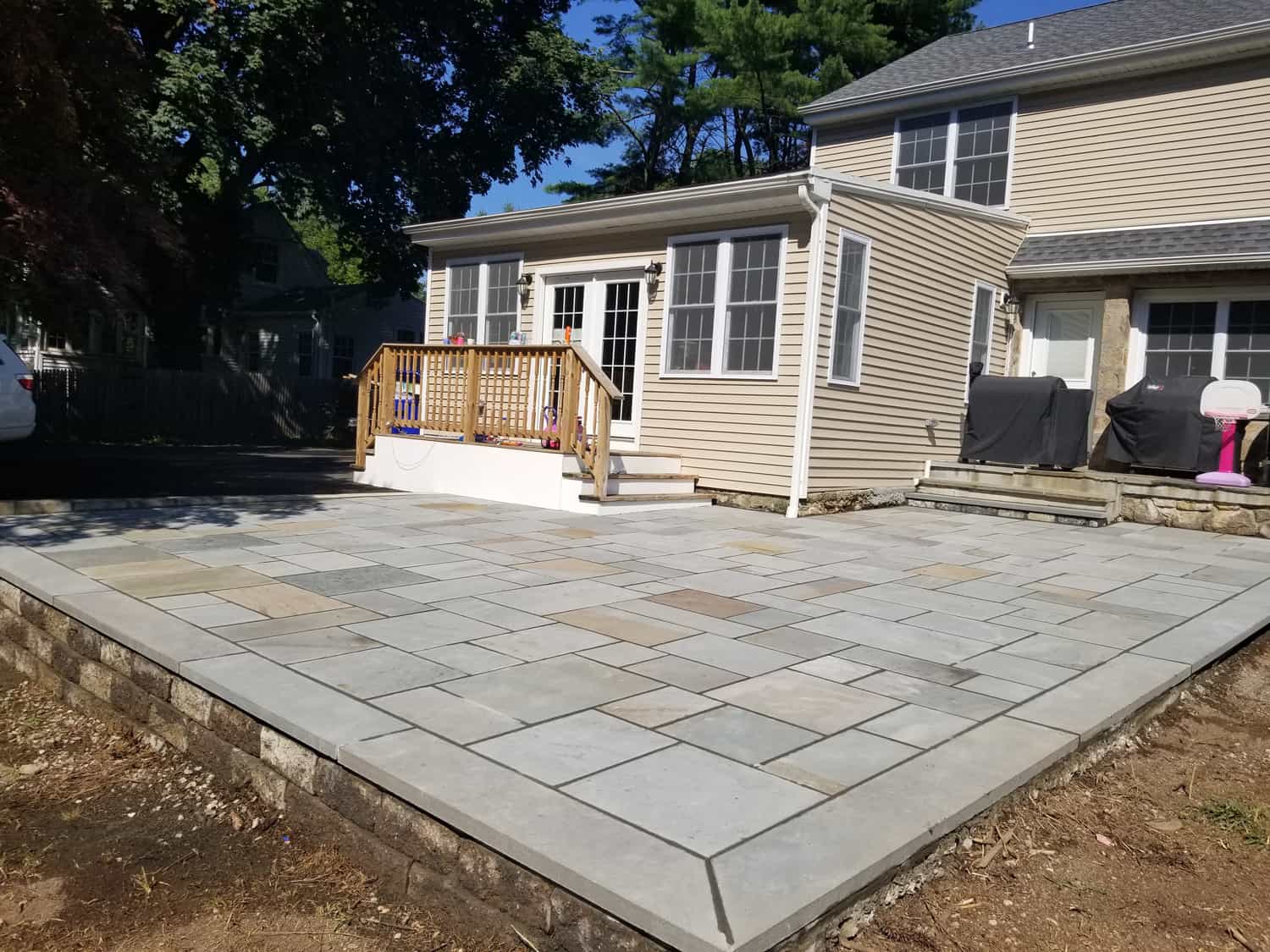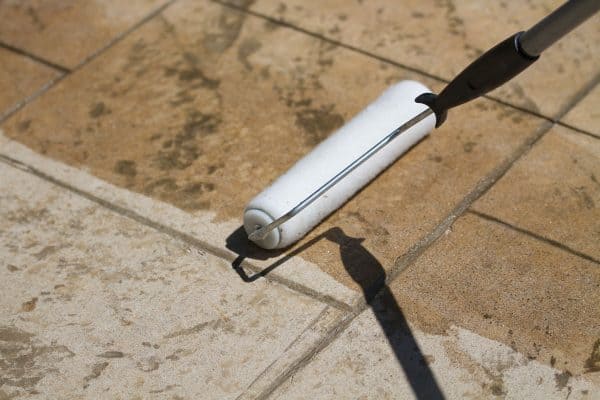Disclosure: We may get commissions for purchases made through links in this post.
Are you perhaps looking for the best paving stone for your driveway? Natural stones such as bluestone will certainly give your driveway an elegant and timeless look. But can you drive on them? We've researched everything you need to know about bluestone pavers and here's the information we found.
You can drive on bluestone pavers, as they are extremely durable and can withstand heavy traffic if they are properly sealed and installed. Thermal-treated bluestone pavers are ideal for driveways, walkways, decks, and patios.
If you wish to install bluestone pavers in your driveway, there are certain things you need to know. Using this kind of natural stone has its advantages and disadvantages. We're here to help you find out more about bluestone pavers, so read on.
![Autumn, sunny day in the woods by the lake in the park with bluestone paver, Can You Drive On Bluestone Pavers? [Pros & Cons Of Bluestone For Driveways]](https://pavingplatform.com/wp-content/uploads/2022/04/Can-You-Drive-On-Bluestone-Pavers-Pros-Cons-Of-Bluestone-For-Driveways.png)
Can Bluestone Be Used On Driveway?
As a homeowner, you want to have what's best for your home. Your driveway is no exception. Bluestone pavers are among the best paver options for your driveway. They're incredibly versatile, so they're not just limited to patios, landscaping, and walkways.
If you're having doubts about whether bluestone is a good choice for a driveway, you may wonder if they are easily damaged and prone to cracks. The good news is that this isn't the case!
As long as these natural stones are properly sealed and installed, they would definitely last for decades. Since bluestones are volcanic rocks, they have undergone a lot of pressure and gone through processes that make them durable. This means they would be tough enough to last long in your driveway.
Another thing you must keep in mind is that there are several types of bluestone finishes. Each type serves a different purpose and aesthetics. The best bluestone for driveways is thermal bluestone.
Thermal Bluestone

Thermal bluestones are ideal for driveways. Because these stones are quarried deeper into the earth, they can withstand heavy pressure which makes them more durable.
This type of bluestone will undergo a process called thermaling. This stone is cut using a diamond-bladed saw. The saw will then leave an unnatural smooth surface which will require the stone to be re-textured.
This is where thermaling comes into play. After cutting, the stone is rapidly heated using a torch to expose its natural rough surface. Because of the thermaling procedure, these stones have even thickness and sizes. This makes them easier to install than other kinds of bluestone.
However, thermal bluestone requires expensive blades and a lot of machinery which makes it costly to produce. Because of this, it is more expensive than any other bluestone finish.
What are The Pros and Cons of Bluestone Driveway
Before installing a bluestone driveway, there are certain things you must keep in mind. The advantages and disadvantages play a significant part in choosing whether bluestone pavers are the most suitable choice for your driveway.
Pros
1. Bluestone Is Durable
Durability is one of the most important factors to consider when deciding which paver to install. Bluestones are extremely durable. They're resistant to breaking and cracking because they're volcanic stones that have overcome extreme pressure.
Some people complain that these stones easily break whenever they use them for driveways. This situation may arise if the pavers are not properly sealed and installed. Choosing the wrong bluestone finish can also be a possible reason for this to happen.
Before buying and installing bluestones, ask your local hardscape supplier if they are selling thermal bluestones. If this type of paving stone is not available, you can always opt for pavers that resemble bluestones.
2. Bluestone Is Water and Weather-Resistant
Bluestone pavers are water-resistant, which is why it's suitable for pool use. This quality makes them ideal for your driveway as well, since they can outlast harsh weather conditions.
Driveways are usually prone to extreme heat, rain, or snow. Because of this, it's ideal to have bluestone pavers that can handle all types of weather, even if you live in an area with freezing or extremely high temperatures.
3. Bluestone Has An Anti-Slip Surface
A slippery driveway can cause accidents. When you use bluestone pavers for your driveway, you won't have to worry about skidding through your driveway because bluestone pavers are capable of absorbing moisture. Its non-slippery surface is one of its best qualities.
This is also the reason why homeowners prefer to use bluestone pavers in their pool area. Unlike concrete and bricks, they have high slip resistance.
Man-made paving materials are not able to withstand rainfall and are prone to discoloration. This is why natural stones are best for your pool and driveway.
4. Bluestone Is Appealing
Bluestone pavers create a dramatic effect wherever you decide to install them. It celebrates the style of the mid-Atlantic region, and it gives off an aura of tranquility that makes anyone who looks at it feel instantly calm.
The appearance of bluestone makes it unique. Some stones have mixed shades of blue and gray which are visible depending on the stone’s sunlight exposure. The shades also even vary from rusty brown to purple!
The elegance of bluestone pavers creates a classic and timeless atmosphere. Its beauty stands out from other natural and fabricated stones.
5. Bluestone Is Easier To Maintain
Another upside of having bluestone pavers is that it does not stain easily. Because it is a dense material, it tends to absorb oil and moisture.
All you have to do is to mix detergent with water, then gently scrub the surface with a brush. You can also use vinegar to remove the stains if there are any. Because the surface of bluestone pavers is water-resistant, it can be washed easily.
Cons
1. Bluestone Absorbs Heat
One downside of bluestone pavers is that they can get extremely hot when exposed to heat for a long period of time. But don't worry; this won't affect the tires of your vehicle.
It is advisable to install bluestone pavers in a shady environment. If your driveway is surrounded by trees, the heat absorption of these pavers may be lessened.
2. Bluestone Is Expensive
Because bluestones are volcanic rocks that are quarried and the cost for quarrying is high, these pavers have high prices. Plus, bluestone is only available in select areas, making them a rare kind of stone.
Across the country, the cost for bluestone pavers is at least $17 to $25. This depends on what kind of bluestone you want to avail.
3. Bluestone Pavers Are Difficult To Install
Like all types of pavers, bluestone needs to be sealed. Installing it can be quite arduous for contractors. Its thickness makes it more durable; however, this can also make the installation process labor-intensive.
Even pavers sawn to perfection have some irregularities when it comes to shapes and sizes. Contractors will have to cut the stones into equal sizes so that they can install them perfectly.
Do bluestone pavers crack?
Bluestone is likely to crack if they are not well-maintained. Since these stones and the mortar joints lay flat, water would eventually sit on them creating hairline cracks on the latter.
Once this happens, the water will flow deep into the mortar joints and eventually break them. Afterward, the same water will go under the stone and will start damaging and cracking these bluestones.
However, bluestone pavers are sturdy materials that won't crack easily if they're properly sealed and maintained. Sealing protects pavers from mineral stains and extends your paving stones' lifespan.
Does bluestone need to be sealed?
After installation, it is necessary to seal bluestone pavers - whether it be on patios, driveways, walkways, etc. Sealing your bluestone pavers is needed for maintenance and stain resistance.
If you want to use a water-based sealer, you will have to reapply the sealant every after 3 to 5 years to ensure its efficacy. On the other hand, if you use an acrylic sealer, it is ideal to reseal your pavers every 2 to 3 years.
In Closing
One piece of advice we can give you is to not be afraid of the disadvantages of bluestone pavers. The benefits outweigh its drawbacks, especially when it comes to your driveway!
Always keep in mind that you have to install and seal bluestone pavers properly to maximize their use and potential. If you don't do this, your pavers would be easily damaged.
If you found this article helpful, check out these other posts:

![Vibrant Red Paver Stone Path, Can You Spray Paver Sealer? [How To Apply It]](https://pavingplatform.com/wp-content/uploads/2022/04/Vibrant-Red-Paver-Stone-Path-600x400.jpg)
![Properly laid out red pavers for a garden, Can You Tint Paver Sealer? [And How To]](https://pavingplatform.com/wp-content/uploads/2022/04/Properly-laid-out-red-pavers-for-a-garden-600x400.jpg)
